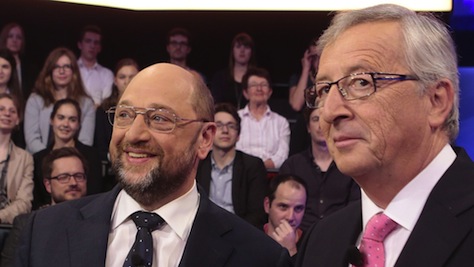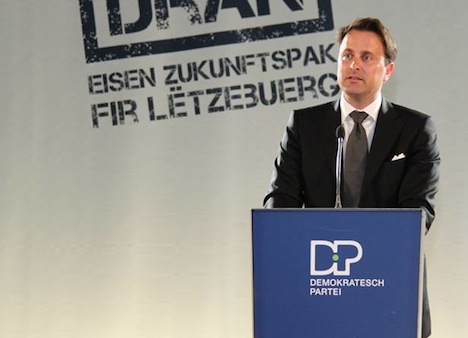If you believe the hype, the contest between Luxembourg’s Jean-Claude Juncker (pictured above, right) and Germany’s Martin Schulz (pictured above, left) is the European equivalent to the American election of 1800.![]()
Fully 214 years ago, American voters (or, more accurately, white, male American property-holders) went to the polls in what was just the second contested presidential election in US history, pitting the incumbent, John Adams of Massachusetts, against Thomas Jefferson of Virginia.
The aftermath of that election demonstrated flaws in the nascent American democracy’s constitution when Jefferson and his running mate, Aaron Burr, both received 73 votes in the US electoral college. The clear intention was always that Burr was Jefferson’s running mate. Yet as a technical matter, the two candidates were tied in the only presidential vote that mattered in the electoral college. Jefferson ultimately prevailed, but only after 36 grueling ballots in the US House of Representatives. Four years later, the United States adopted the 12th amendment to its constitution, separating the electoral college vote for president and vice president.
Which is to say, new political systems often go through growing pains and their fair share of trial-and-error.
So it will be with the European Union. The Treaty of Lisbon, which came into effect in 2009, directs the European Council (the group of 28 European heads of state and/or government) to ‘propose’ a candidate for president of the European Commission (the European Union’s chief executive and regulatory body) to be ‘elected’ by the European Parliament.
* * * * *
RELATED: In Depth: European parliamentary elections
* * * * *
Each of Europe’s major families of political parties took the new treaty language as a sign to field Commission presidential candidates in advance of this weekend’s European elections. Though five groups ultimately selected candidates, the greatest attention has focused upon those of the two largest blocs in the European Parliament, Juncker’s center-right, Christian democratic European People’s Party (EPP) and Schulz’s center-left, social democratic Party of European Socialists (PES).
As the Europe-wide candidates of their respective parliamentary groups, Juncker and Schulz have become the standard-bearers of the most pan-European election campaign in history. They’ve traveled the breadth of the European Union, and they’ve faced off in debate after debate. The challengers have become delightfully known as the Spitzenkandidaten in Germany, a neologism that’s caught on throughout the European Union.
But beyond the symbolism and the novelty, does anyone in Europe care? Continue reading Here come the Spitzenkandidaten! But does anybody care?

